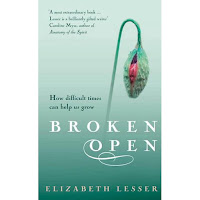Four books are stacked on my desk within an arm's reach when I sit down to write...which is every day. These are the books that taught me how to write, and why I should stick with it. They inspire me. They motivate me. They fill me with desire and longing. With envy. They are always at my side.
A couple of years ago a friend of mine pried my clenched fist open and pressed a copy of Elizabeth Berg's book, "Talk Before Sleep", into my hand.
She insisted I read it. She begged me to give it a chance. But back then, I didn't read fiction. Ever. Who had time? I read about medicine. I studied medicine, I lived it, I dreamt it. Still, she assured me that this would be a quick read, and because I love her, I did it for her. I took it to the beach with me that summer, and I read it.
Well, let me tell you...I loved this book so much I wanted to crawl inside of it and stay there forever...while at the same time, I grew to despise this woman, Berg. I was that JEALOUS of her. I couldn't imagine how she'd come to write so beautifully. And because I thought it was impossible for me, I abandoned my own dream of writing out of pure, unadulterated despair.
And then, my muse stepped in.
"Fool,'' said my muse to me.
"Look in thy heart and write."
~Philip Sidney~
Now, you have to know my muse. She possesses a pretty mean oppositional-defiant streak. In fact, she can be an absolute nag. So...of course, she put her foot down and started feeding me little snippets of character, scene, and dialogue at the oddest times...when I was walking the dogs, or daydreaming in church, or fetching the mail...serving up tidbits of inspiration like manna in the desert.
As if that weren't enough, the "boys in the basement" got into the act, too. They started sending up some pretty darn decent plot points. And they kept fanning the ashes until a lone smoldering cinder of desire reignited my passion for writing.
"We don't choose
what's going to wake us up."
~Dani Shapiro~
So...I guess you could say that the book that nearly extinguished my desire to write was the same book that ultimately inspired me to try. Which is why I keep it close.
"Broken Open", by Omega Institute co-founder Elizabeth Lesser is an absolutely lyrical book about how to navigate difficulties in life, and how they can help us grow. It is simply a pleasure to read her beautifully written words, so I keep her nearby, too.
"Memoir as Medicine" by Nancy Slonim Aronie is there, too. I have been fortunate to have studied with her at numerous workshops over the years, absorbing nothing but positive energy when she teaches. Encouragement. Support. Affirmation. Something we all need every day.
But...this is THE BOOK:
If you are a writer, or you yearn to write but don't think you have it in you, or you simply appreciate good writing when you read, you should run right out and get this book. If you want to know what it's like to live the life of a writer...if you wonder how all those books get onto the shelves, and who does all that writing, and what it takes to stick with it, you should get this book. If you appreciate honesty, seek truth, and love metaphor...this book delivers it all. To me, it felt as though the author and I must have met over a cup of coffee or a glass of wine in some previous life and shared everything we knew about the life of a writer...the pleasure and the pain, the victories and defeats, the humor and the gravity of it all. It was as though she somehow captured every unspoken thought of mine and translated each one into words on the page.
Which writer inspires and motivates you? What books do you keep close at hand?
When will you write yours?
"Everything you need to know about life
can be learned from a genuine and ongoing
attempt to write."
~Dani Shapiro~
jan
.JPG)





